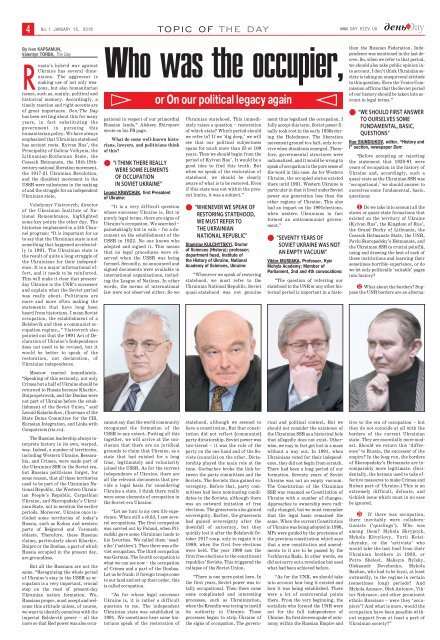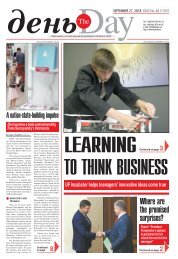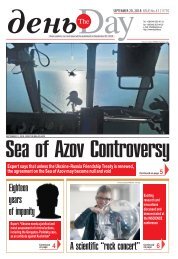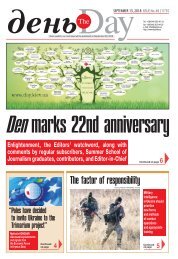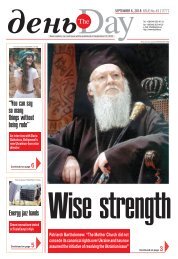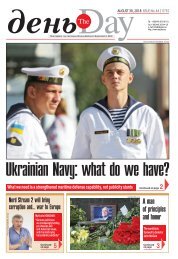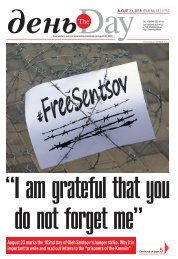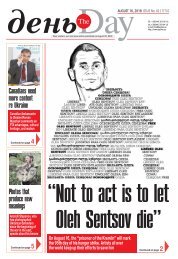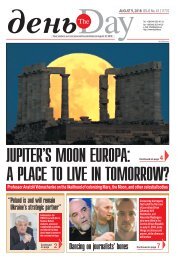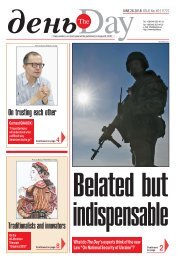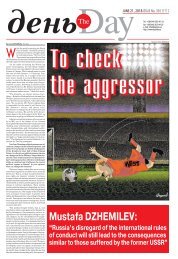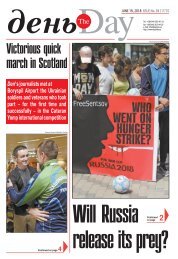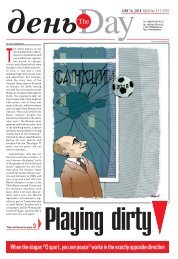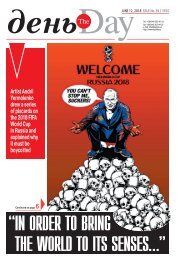#1_1-8
Create successful ePaper yourself
Turn your PDF publications into a flip-book with our unique Google optimized e-Paper software.
4<br />
No.1 JANUARY 16, 2018<br />
TOPIC OF THE DAY<br />
WWW.DAY.KIEV.UA<br />
By Ivan KAPSAMUN,<br />
Valentyn TORBA, The Day<br />
Russia’s hybrid war against<br />
Ukraine has several dimensions.<br />
The aggressor is<br />
making use of not only weapons,<br />
but also humanitarian<br />
issues, such as, mainly, political and<br />
historical memory. Accordingly, a<br />
timely reaction and right accents are<br />
of great importance. Den/The Day<br />
has been writing about this for many<br />
years, in fact substituting the<br />
government in pursuing this<br />
humanitarian policy. We have always<br />
emphasized that Ukrainian statehood<br />
has ancient roots. Kyivan Rus’, the<br />
Principality of Galicia-Volhynia, the<br />
Lithuanian-Ruthenian State, the<br />
Cossack Hetmanate, the 18th-19thcentury<br />
national liberation movement,<br />
the 1917-21 Ukrainian Revolution,<br />
and the dissident movement in the<br />
USSR were milestones in the making<br />
of and the struggle for an independent<br />
Ukrainian state.<br />
Volodymyr Viatrovych, director<br />
of the Ukrainian Institute of National<br />
Remembrance, highlighted<br />
some key points the other day. The<br />
historian emphasized in a 5th Channel<br />
program: “It is important for us<br />
to say that the Ukrainian state is not<br />
something that happened accidentally<br />
in 1991. The Ukrainian state is<br />
the result of quite a long struggle of<br />
the Ukrainians for their independence.<br />
It is a major informational effort,<br />
and it needs to be reinforced.<br />
This will make it clear that presentday<br />
Ukraine is the UNR’s successor<br />
and explain what the Soviet period<br />
was really about. Politicians are<br />
more and more often making the<br />
statements that have long been<br />
heard from historians. I mean Soviet<br />
occupation, the establishment of a<br />
Bolshevik and then a communist occupation<br />
regime…” Viatrovych also<br />
pointed out that the 1991 Act of Declaration<br />
of Ukraine’s Independence<br />
does not need to be revised, but it<br />
would be better to speak of the<br />
restoration, not declaration, of<br />
Ukrainian independence.<br />
Moscow reacted immediately.<br />
“Speaking of this seriously, not only<br />
Crimea but a half of Ukraine should be<br />
returned to Russia because Kharkiv,<br />
Dnipropetrovsk, and the Donbas were<br />
not part of Ukraine before the establishment<br />
of the Soviet Union,” said<br />
Leonid Kalashnikov, Chairman of the<br />
State Duma Committee for the CIS,<br />
Eurasian Integration, and Links with<br />
Compatriots (ria.ru).<br />
The Russian leadership always interprets<br />
history in its own, warped,<br />
way. Indeed, a number of territories,<br />
including Western Ukraine, Bessarabia,<br />
and Crimea, were made part of<br />
the Ukrainian SSR in the Soviet era,<br />
but Russian politicians forget, for<br />
some reason, that all these territories<br />
used to be part of the Ukrainian National<br />
Republic, the Western Ukrainian<br />
People’s Republic, Carpathian<br />
Ukraine, and Skoropadsky’s Ukrainian<br />
State, not to mention the earlier<br />
periods. Moreover, Ukraine once included<br />
some territories of today’s<br />
Russia, such as Kuban and western<br />
parts of Belgorod and Voronezh<br />
oblasts. Therefore, these Russian<br />
claims, particularly about Kharkiv,<br />
Dnipro or the Donbas, a part of which<br />
Russia occupied in the present day,<br />
are groundless.<br />
Who was the occupier,<br />
pational in respect of our primordial<br />
Russian lands,” Aleksey Shiropaev<br />
wrote on his FB page.<br />
What do some well-known historians,<br />
lawyers, and politicians think<br />
of this?<br />
● “I THINK THERE REALLY<br />
WERE SOME ELEMENTS<br />
OF OCCUPATION<br />
IN SOVIET UKRAINE”<br />
Leonid KRAVCHUK, first President<br />
of Ukraine:<br />
“It is a very difficult question<br />
whose successor Ukraine is. But in<br />
purely legal terms, there are signs of<br />
Ukraine’s occupation. We searched –<br />
painstakingly but in vain – for a document<br />
on the establishment of the<br />
USSR in 1922. No one knows who<br />
adopted and signed it. This means<br />
that no legal procedures were observed<br />
when the USSR was being<br />
formed. Secondly, no announced and<br />
signed documents were available in<br />
international organizations, including<br />
the League of Nations. In other<br />
words, the norms of international<br />
law were not observed either. So we<br />
But all the Russians are not the<br />
same. “Recognizing the whole period<br />
of Ukraine’s stay in the USSR as occupation<br />
is a very important, crucial<br />
step on the road of present-day<br />
Ukrainian nation formation. We,<br />
Russians proper, must accept and welcome<br />
this attitude unless, of course,<br />
we want to identify ourselves with the<br />
imperial Bolshevik power – all the<br />
more so that Red power was also occucannot<br />
say that the world community<br />
recognized the formation of the<br />
USSR to any extent. Putting all this<br />
together, we will arrive at the conclusion<br />
that there are no juridical<br />
grounds to claim that Ukraine, as a<br />
state that had existed for a long<br />
time, legitimately and voluntarily<br />
joined the USSR. As for the current<br />
independence of Ukraine, there are<br />
all the relevant documents that provide<br />
a legal basis for considering<br />
Ukraine a state. I think there really<br />
were some elements of occupation in<br />
the Soviet-era Ukraine.<br />
“Let me turn to my own life experience.<br />
When still a child, I saw several<br />
occupations. The first occupation<br />
was carried out by Poland, when Pilsudski<br />
gave some Ukrainian lands to<br />
his favorites. We called them ‘osadniks’<br />
(‘settlers’). Then there was a Soviet<br />
occupation. The third occupation<br />
was German. The fourth occupation is<br />
what we can see now – the occupation<br />
of Crimea and a part of the Donbas.<br />
Let us be frank: if foreign troops come<br />
to our land and set up their order, this<br />
is called occupation.<br />
“As for whose legal successor<br />
Ukraine is, it is rather a difficult<br />
question to me. The independent<br />
Ukrainian state was established in<br />
1991. We sometimes hear some historians<br />
speak of the restoration of<br />
or On our political legacy again<br />
Ukrainian statehood. This immediately<br />
raises a question – restoration<br />
of which state? Which period should<br />
we refer to? If we ‘dig deep,’ we will<br />
see that our political subjectness<br />
spans for much more than 25 or 100<br />
years. Then we should begin from the<br />
period of Kyivan Rus’. It would be a<br />
good idea to find this truth. But<br />
when we speak of the restoration of<br />
statehood, we should be clearly<br />
aware of what is to be restored. Even<br />
if this state was not within the present<br />
limits, it was a subject.”<br />
● “WHENEVER WE SPEAK OF<br />
RESTORING STATEHOOD,<br />
WE MUST REFER TO<br />
THE UKRAINIAN<br />
NATIONAL REPUBLIC”<br />
Stanislav KULCHYTSKYI, Doctor<br />
of Sciences (History); professor;<br />
department head, Institute of<br />
the History of Ukraine, National<br />
Academy of Sciences, Ukraine:<br />
“Whenever we speak of restoring<br />
statehood, we must refer to the<br />
Ukrainian National Republic. Soviet<br />
quasi-statehood was not genuine<br />
statehood, although we seemed to<br />
have a constitution. But that constitution<br />
did not reflect [communist]<br />
party dictatorship. Soviet power was<br />
two-tiered – it was the rule of the<br />
party on the one hand and of the Soviets<br />
(councils) on the other. Dictatorship<br />
played the main role at the<br />
time. Gorbachev broke the link between<br />
the party committees and the<br />
Soviets. The Soviets thus gained sovereignty.<br />
Before that, party committees<br />
had been nominating candidates<br />
to the Soviets, although there<br />
was an outward imitation of free<br />
elections. The grassroots also gained<br />
sovereignty. Earlier, the grassroots<br />
had gained sovereignty after the<br />
downfall of autocracy, but they<br />
quickly lost it after the Bolshevik October<br />
1917 coup, only to regain it in<br />
1989, when the first free elections<br />
were held. The year 1990 saw the<br />
first free elections to the constituent<br />
republics’ Soviets. This triggered the<br />
collapse of the Soviet Union.<br />
❷ What about the borders? Suppose<br />
the UNR borders are an alternament<br />
thus legalized the occupation. I<br />
fully accept this term. Soviet power finally<br />
took root in the early 1930s during<br />
the Holodomor. The liberation<br />
movement ground to a halt, only to revive<br />
when dissidents emerged. Therefore,<br />
governmental structures were<br />
nationalized, and it would be wrong to<br />
speak of occupation in the pure sense of<br />
the word in this case. As for Western<br />
Ukraine, the occupied status existed<br />
there until 1991. Western Ukraine is<br />
particular in that it lived under Soviet<br />
power one generation less than the<br />
other regions of Ukraine. This also<br />
had an impact on the 1991elections,<br />
when western Ukrainians in fact<br />
formed an anticommunist government.”<br />
● “SEVENTY YEARS OF<br />
SOVIET UKRAINE WAS NOT<br />
AN EMPTY VACUUM”<br />
Viktor MUSIIAKA, Professor, Kyiv<br />
Mohyla Academy; Member of<br />
Parliament, 2nd and 4th convocations:<br />
“The question of referring our<br />
statehood to the UNR or any other historical<br />
period is important in a histo-<br />
“There is one more point here. In<br />
the first years, Soviet power was totally<br />
occupational. Then there came<br />
some complicated and interesting<br />
processes, such as Ukrainization,<br />
when the Kremlin was trying to instill<br />
its authority in Ukraine. Those<br />
processes began to strip Ukraine of<br />
the signs of occupation. The governrical<br />
and political context. But we<br />
should not consider the existence of<br />
the Ukrainian SSR as a historical hole<br />
that allegedly does not exist. Otherwise,<br />
we may in fact get lost in a maze<br />
without a way out. In 1991, when<br />
Ukrainians voted for their independence,<br />
they did not begin from scratch.<br />
There had been a long period of our<br />
formation. Seventy years of Soviet<br />
Ukraine was not an empty vacuum.<br />
The Constitution of the Ukrainian<br />
SSR was renamed as Constitution of<br />
Ukraine with a number of changes.<br />
Approaches to ownership were radically<br />
changed, but we must remember<br />
that the legal basis remained the<br />
same. When the current Constitution<br />
of Ukraine was being adopted in 1996,<br />
MPs were guided by the provisions of<br />
the previous constitution which says<br />
that a new constitution and amendments<br />
to it are to be passed by the<br />
Verkhovna Rada. In other words, we<br />
did not carry out a revolution but used<br />
what had been achieved before.<br />
“As for the UNR, we should take<br />
into account how long it existed and<br />
how it was being established. There<br />
were a lot of controversial points<br />
there. From the very beginning, the<br />
socialists who formed the UNR were<br />
not for the full independence of<br />
Ukraine. Its first decrees spoke of autonomy<br />
within the Russian Empire and<br />
then the Russian Federation. Independence<br />
was mentioned in the last decree.<br />
So, when we refer to that period,<br />
we should also take public opinion into<br />
account. I don’t think Ukrainian society<br />
is taking an unequivocal attitude<br />
to this question. Even the Venice Commission<br />
affirms that the Soviet period<br />
of our history should be taken into account<br />
in legal terms.”<br />
● “WE SHOULD FIRST ANSWER<br />
TO OURSELVES SOME<br />
FUNDAMENTAL, BASIC,<br />
QUESTIONS”<br />
Ihor SIUNDIUKOV, editor, “History and<br />
I” section, newspaper Den:<br />
“Before accepting or rejecting<br />
the statement that 1920-91 were<br />
years of occupation in the history of<br />
Ukraine and, accordingly, such a<br />
quasi-state as the Ukrainian SSR was<br />
‘occupational,’ we should answer to<br />
ourselves some fundamental, basic,<br />
questions:<br />
❶ Do we take into account all the<br />
states or quasi-state formations that<br />
existed on the territory of Ukraine<br />
(Kyivan Rus’, the Kingdom of Rus’,<br />
the Grand Duchy of Lithuania, the<br />
Cossack Hetmanate State, the UNR,<br />
Pavlo Skoropadsky’s Hetmanate, and<br />
the Ukrainian SSR (a crucial point!)),<br />
using and drawing the best of each of<br />
these institutions and learning their<br />
sometimes horrible experience, or do<br />
we let only politically ‘suitable’ pages<br />
into history?<br />
tive to the era of occupation – but<br />
they do not coincide at all with the<br />
borders of the current Ukrainian<br />
state. They are essentially more modest.<br />
Should we return this ‘difference’<br />
to Russia, the successor of the<br />
empire? In the long run, the borders<br />
of Skoropadsky’s Hetmanate are incomparably<br />
more legitimate. (Incidentally,<br />
the hetman used to take effective<br />
measures to make Crimea and<br />
Kuban part of Ukraine.) This is an<br />
extremely difficult, delicate, and<br />
ticklish issue which must in no case<br />
be ignored.<br />
❸<br />
If there was occupation,<br />
there inevitably were collaborationists<br />
(‘quislings’). Who was<br />
among them? Mykola Skrypnyk,<br />
Mykola Khvyliovy, Yurii Kotsiubynsky,<br />
or the ‘activists’ who<br />
would take the last food from their<br />
Ukrainian brothers in 1933, or<br />
Petro Shelest, Maksym Rylsky,<br />
Oleksandr Dovzhenko, Mykola<br />
Bazhan, who had to be loyal, at least<br />
outwardly, to the regime in certain<br />
(sometimes long) periods? And<br />
Mykola Amosov, Oleh Antonov, Viktor<br />
Nekrasov, and other prominent<br />
ethnic Russians – were they ‘occupiers’?<br />
And what is more, would the<br />
occupation have been possible without<br />
support from at least a part of<br />
Ukrainian society?”


